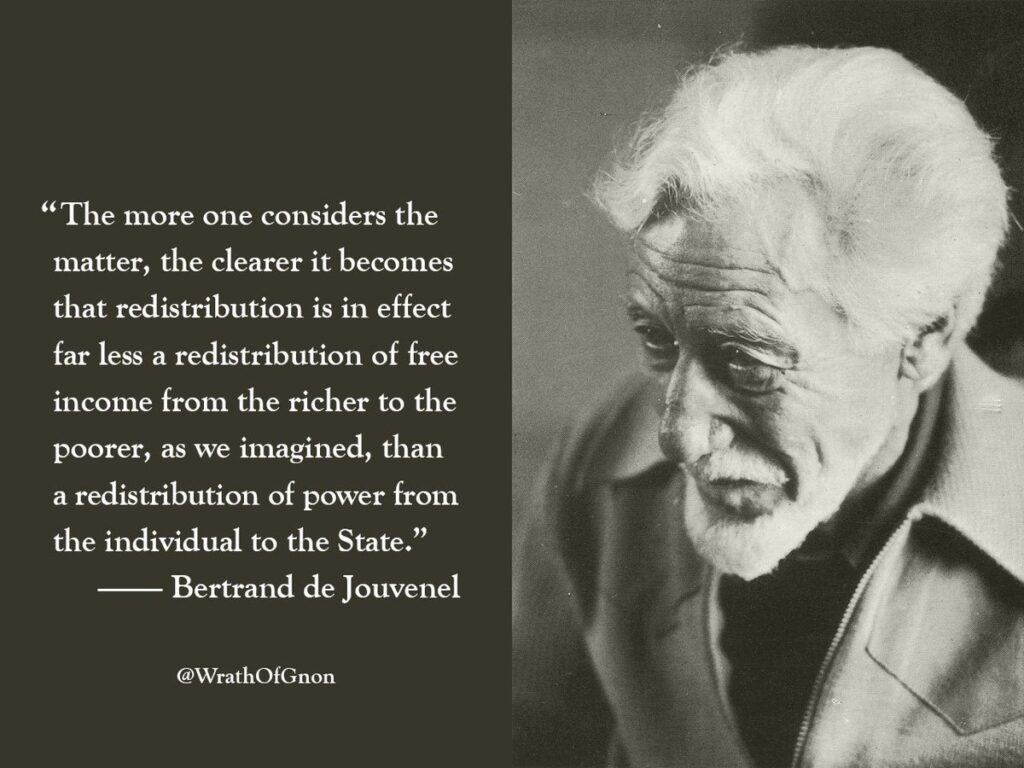For most people, social justice refers to the distribution of benefits in society. The original meaning of social justice, however, had nothing to do with the distribution of anything. The popular understanding of social justice is captured by the American Sociological Review:
As I see it, social justice requires resource equity, fairness, and respect for diversity, as well as the eradication of existing forms of social oppression. Social justice entails a “redistribution” of resources from those who have “unjustly” gained them to those who justly deserve them, and it also means creating and “ensuring” the processes of truly democratic participation in decision-making…. It seems clear that only a “decisive” redistribution of resources and decision-making power can “ensure” social justice and authentic democracy.[1]

Arithmetical uniformity is at the heart of this new definition. It is full of indictments with an “us against them” flavor. More importantly, it requires an agent in charge of enforcing the said rearrangement of benefits. That entity is no other than the state. This definition of social justice is statist by providing to central bodies the power to confiscate and of determining what is just. This is really a dreadful change in the meaning of social justice, because to accomplish it you must give an enormous amount of power to the equalizer—the state.
The concept of re-distribution implies that benefits are not earned in the first place so the success of some is uncalled for and in need of redress. That concept is also collectivist, as redress is owed to groups. Certain characteristics provide members of groups the right to receive benefits and certain characteristics demand that members of other groups rescind something. Who is supposed to balance things? The state. Alongside the notion of collective redress is the notion of collective victimization and collective guilt. The implications of such an understanding of how society works are severe for the prospect of social cohesion. At the end of that path is not justice but mutual resentment, because victimization is insatiable and guilt becomes a stigma.
More importantly, the modern mind has become so ingrained with the alluring music of social justice that the mere mention of it weakens the resolve to resist what otherwise might be seen as nonsense. As Friedrich Hayek surmised in his Law, Legislation, and Liberty,
The appeal to ‘social justice’ has nevertheless by now become the most widely used and most effective argument in political discussion. Almost every claim for government action on behalf of particular groups is advanced by its name, and if it can be made to appear that a certain measure is required by ‘social justice,’ opposition to it will rapidly weaken.[2]
Another word associated with social justice is “the common good.” A wonderful term in itself, its meaning in practice often hinges on a key question, namely, who decides what is the common good. In contemporary times that responsibility gradually shifted to the bureaucratic state. The beautiful notion of the common good thereby got ensnared in red tape and in battles for power. The common good has become an excuse for state control, the passing of laws, the expansion of the bureaucratic state, and government decision-making—so much so that most people think immediately of the government and “what are they going to do” every time there is a crisis. As the state has become the agent of social justice, people can eschew personal responsibility and fix their gaze on impersonal structures. Structures now have become a living being, a system that can be blamed or praised according to a collectivist ideology. Interestingly, the common good has often been the excuse on which totalitarianism has been built. You can achieve the common good better if there is a total authority, one that limits the desires and actions of individuals. Individual aims are seen as problematic and divisive and any system purporting to defend individual rights such as the right to property or even the right to have your own opinion must be challenged. Political correctness, statism, and collectivism are all engendered by a false notion of social justice.

Another word associated with social justice is compassion. In modern times, an extraordinary number of bad things have been done in the name of compassion for the poor. Modern revolutions are almost all fought in the name of the poor and the oppressed. More sins have been committed in the name of compassion in the last 150 years than by any other force in history. We must not allow that beautiful term to blind us. The word is so powerful that people forget what instrument is being used to affect a result. “By all means necessary” seems about right as long as the claim is that we are being compassionate. In a strict sense, compassion means to be there with the one who suffers—it is an individual call to action and solidarity that may or may not alleviate the problem but is always faithfully present and involved in the act of suffering. But again, if social justice is about group entitlement and centralized action, individual responsibility to suffer with the other is madness!
Bertrand de Jouvenel is correct in stating that “[i]t is a loose modern habit to call ‘just’ whatever is thought emotionally desirable.”[3] The dictatorship of appetite can camouflage as social justice. It is easy to feel that whatever we see as in need of change necessitates an intervention. The proportional distribution of resources according to need is just around the corner of an emotional appeal to fix things. Just as it feels improper that some lack what they need, it feels wrong that in our estimation some have more than they need. Who is to restore the proper balance? The state. Upon a society rebelling against its capacity to raise the standard of living to unimaginable highs soon falls a low of guilt that triggers the eager hands of the statists. All of this shuffling of earned resources to unearning hands has been called social justice.

The loss of the traditional understanding of social justice has resulted in confusion and abandonment of the term by many. The concept of justice pertains to what is owed to a person. It is primarily a virtue of individuals. I must develop the sense that I must give to others what they deserve. A person is just when that person develops the habit of giving to others (either other individuals or a community) what is owed to them. Social justice directs the acts of individuals toward the common good. In the end, I agree with Michael Novak when he said that social justice is a virtue of individuals or it is a fraud.[4]
Alexis de Tocqueville said the most fascinating and insightful thing about America that relates to the authentic sphere of social justice. In America, people get together and form associations. They hold bake sales to send missionaries to the Antipodes, to build colleges. They invent hundreds of devices to raise money among themselves. That’s what a free people do. The Americans of Tocqueville’s time took personal responsibility for the common good as each saw an individual duty to give something to their community. That is social justice: not what the community owed to groups by way of state power but what individuals and free associations of individuals owe to each other and to their society.
And that’s what, in a word, social justice is—a virtue, a habit that people internalize and learn, a capacity. It’s a capacity that has two sides: first, a capacity to organize with others to accomplish particular ends and, second, ends that are extra-familial. They’re for the good of the neighborhood, or the village, or the town, or the state, or the country, or the world. Finally, it’s important to note that this correct notion of social justice is ideologically neutral. It’s as common to people on the Left to organize and form associations, to cooperate in many social projects, as it is to people on the Right. This is not a loaded political definition, but it does avoid the pitfall (on the Left) of thinking that social justice means redistribution, égalité, the common good only as determined by state authority, and so forth. It also avoids the pitfall (on the Right) of thinking of the individual as unencumbered, closed-up, self-contained, self-sufficient and interested only in personal.
[1] Novak, Michael, Social Justice: Not What You Think, Heritage Foundation (December 29, 2009) https://www.heritage.org/poverty-and-inequality/report/social-justice-not-what-you-think-it/#_ftn2
[2] Hayek, Friedrich, Law, Legislation & Liberty, vol. 2, “The Mirage of Social Justice”, 1976.
[3] De Juvenel, Bertrand, The Ethics of Redistribution (Indianapolis: Liberty Fund, 1990) p. 18.
[4] Novak, Michael, Defining Social Justice, First Things (December 2000) https://www.firstthings.com/article/2000/12/defining-social-justice



